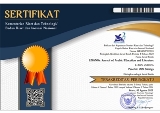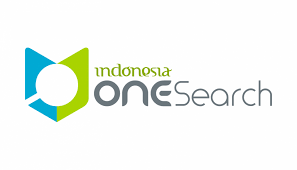Analysis of Prospective Arabic Teachers’ Technological Pedagogical Content Knowledge (TPACK)
Abstract
21st-century learning requires teachers to integrate technology into learning. Therefore, teachers need to improve their professional abilities in using technology. This research was conducted to obtain the TPACK profile of prospective Arabic language teachers who are currently studying for undergraduate program at Arabic Education department of IAIN Pekalongan. Furthermore, this research is survey research. Accordingly, primary data was collected by distributing questionnaires. In addition, researchers also used observation and documentation. In general, the TPACK for prospective Arabic teachers is categorized as "good". Howevers, there are some aspects that need to be improved, namely Content Knowledge, Pedagogical Content Knowledge, and Technological Pedagogical Content Knowledge itself. In addition, each item with lower value than the total average of all aspects needs to be considered as well. In addition, the results of this analysis provide information related to the TPACK for prospective Arabic teachers that is useful as evaluation material for interested parties, such as Lembaga Pendidikan Tenaga Kependidikan (LPTK) as an institution in higher education that is assigned to prepare professional teachers.
Keywords
Full Text:
PDFReferences
Absari, Nalurita, Priyanto Priyanto, and Muslikhin Muslikhin. 2020. “The Effectiveness of Technology, Pedagogy and Content Knowledge (TPACK) in Learning.” Jurnal Pendidikan Teknologi Dan Kejuruan 26(1):43–51. doi: 10.21831/jptk.v26i1.24012.
Aditama, Vina, and Dini Restiyanti Pratiwi. 2021. “Integrasi Technological Pedagogical Content Knowledge (TPACK) Dalam Perangkat Pembelajaran Daring Guru Bahasa Indonesia.” Basastra 10(2):196–209. doi: 10.24114/bss.v10i2.26621.
Alivi, Justsinta Sindi. 2019. “A review of tpack and samr models: how should language teachers adopt technology?” Journal of English for Academic and Specific Purposes 2(2):1–11. doi: 10.18860/jeasp.v2i2.7944.
Amra, Abhanda. 2016. “Profesionalisme guru untuk meningkatkan mutu pendidikan di era teknologi informasi.” Ta’dib 14(2). doi: 10.31958/jt.v14i2.210.
Anon. 2019. “KMA No. 183 Tahun 2019 Tentang Kurikulum PAI Dan Bahasa Arab Pada Madrasah.”
Anon. n.d.-a. “Prospek Kerja.” Retrieved December 28, 2021 (https://pba.ftik.iainpekalongan.ac.id/index.php/profil/prospek-kerja).
Anon. n.d.-b. “UU No. 14 Tahun 2005 Tentang Guru Dan Dosen [JDIH BPK RI].” Retrieved November 20, 2021 (https://peraturan.bpk.go.id/Home/Details/40266/uu-no-14-tahun-2005).
Arikunto, Suharsimi. 2014. Prosedur Penelitian: Suatu Pendekatan Praktik. Jakarta: Rineka Cipta.
Busono, Rr Tjahyani, Riskha Mardiana, and Kunthi Herma Dwidayati. 2021. “Understanding Level of Technology Pedagogy and Content Knowledge (TPACK) Students of Architectural Engineering Education Study Program.” Journal of Architectural Research and Education 3(1):59–66. doi: 10.17509/jare.v3i1.30656.
Etikan, Ilker, Sulaiman Abubakar Musa, and Rukayya Sunusi Alkassim. 2015. “Comparison of Convenience Sampling and Purposive Sampling.” American Journal of Theoretical and Applied Statistics 5(1):1. doi: 10.11648/j.ajtas.20160501.11.
Farikah, Farikah, and Moch Malik Al Firdaus. 2020. “Technological Pedagogical and Content Knowledge (TPACK): The Students’ Perspective on Writing Class:” Jurnal Studi Guru Dan Pembelajaran 3(2):190–99. doi: 10.30605/jsgp.3.2.2020.303.
Jang, Syh-Jong, and Meng-Fang Tsai. 2013. “Exploring the TPACK of Taiwanese Secondary School Science Teachers Using a New Contextualized TPACK Model.” Australasian Journal of Educational Technology 29(4). doi: 10.14742/ajet.282.
Khaira, Imamul Khaira, Evi Susilawati, and Refli Renaldi. 2021. “Implementasi rancangan pembelajaran berbasis TPACK sebagai integrasi pembelajaran di era society 5.0 untuk meningkatkan hasil belajar mata kuliah ekonomi kesehatan.” Jurnal Teknologi Pendidikan (JTP) 14(2):111–19. doi: 10.24114/jtp.v14i2.28336.
Kirom, Askhabul. 2017. “Peran guru dan peserta didik dalam proses pembelajaran berbasis multikultural.” Jurnal Al-Murabbi 3(1):69–80.
Koehler, Matthew, and Punya Mishra. 2009. “What Is Technological Pedagogical Content Knowledge (TPACK)?” Contemporary Issues in Technology and Teacher Education 9(1):60–70.
Kurniawan, Agung Widhi, and Zarah Puspitaningtyas. 2016. Metode Penelitian Kuantitatif. Yogyakarta: Pandiva Buku.
Majid, Mohammad Rusdi Ab, and Zawawi Ismail. 2018. “[Knowledge of Arabic Teacher Technology and Its Relationship with Teaching Creativity in Malaysia] Pengetahuan Teknologi Guru Bahasa Arab Dan Hubungannya Dengan Kreativiti Pengajaran Di Malaysia.” Jurnal Islam Dan Masyarakat Kontemporari 18(1):1–13.
Mardapi, Djemari. 2012. Pengukuran Penilaian Dan Evaluasi Pendidikan. Yogyakarta: Nuha.
Muslim, Imam, I Komang Werdhiana, and Amiruddin Kade. 2020. “Analisis Technological Pedagogical Content Knowledge (TPACK) Mahasiswa Program Studi Pendidikan Fisika Dalam Memahami Konsep Gerak Lurus.” Jurnal Kreatif Online 8(3).
Mutiani, Mutiani, Nana Supriatna, Ersis Warmansyah Abbas, Tika Puspita Widya Rini, and Bambang Subiyakto. 2021. “Technological, Pedagogical, Content Knowledge (TPACK): A Discursions in Learning Innovation on Social Studies.” The Innovation of Social Studies Journal 2(2):135–42. doi: 10.20527/iis.v2i2.3073.
Nevrita, Nevrita, Nurul Asikin, and Trisna Amelia. 2020. “Analisis Kompetensi TPACK pada Media Pembelajaran Guru Biologi SMA.” Jurnal Pendidikan Sains Indonesia 8(2):203–17. doi: 10.24815/jpsi.v8i2.16709.
Nindiasari, Hepsi, Nena Restiana, and Aan Subhan Pamungkas. 2021. “IMPLEMENTATION OF THE TPACK FRAMEWORK TO MEASURE INTEGRATION OF TECHNOLOGY, PEDAGOGY AND THE CONTENT OF LECTURERS IN MATHEMATICS EDUCATION.” Prima: Jurnal Pendidikan Matematika 5(2):30–39. doi: 10.31000/prima.v5i2.4158.
Nofrion, Nofrion, Bayu Wijayanto, Ratna Wilis, and Rery Novio. 2018. “Analisis Technological Pedagogical and Content Knowledge (TPACK) Guru Geografi di Kabupaten Solok, Sumatera Barat.” JURNAL GEOGRAFI 10(2):105–16. doi: 10.24114/jg.v10i2.9070.
Nursyifa, Aulia, Imam Fitri Rahmadi, and Eti Hayati. 2020. “TPACK Capability Preservice Teachers Civic Education in the Era of Industrial Revolution 4.0.” JPI (Jurnal Pendidikan Indonesia) 9(1):15–29. doi: 10.23887/jpi-undiksha.v9i1.17982.
Nuryani, Danik, and Ita Handayani. 2020. “KOMPETENSI GURU DI ERA 4.0 DALAM MENINGKATKAN MUTU PENDIDIKAN.” PROSIDING SEMINAR NASIONAL PROGRAM PASCASARJANA UNIVERSITAS PGRI PALEMBANG 0(0).
Rahmadi, Imam Fitri. 2019a. “Penguasaan technological pedagogical content knowledge calon guru Pendidikan Pancasila dan Kewarganegaraan.” Jurnal Civics: Media Kajian Kewarganegaraan 16(2):122–36. doi: 10.21831/jc.v16i2.20550.
Rahmadi, Imam Fitri. 2019b. “Technological Pedagogical Content Knowledge (TPACK): Kerangka Pengetahuan Guru Abad 21.” Jurnal Pendidikan Kewarganegaraan 6(1):65–74. doi: 10.32493/jpkn.v6i1.y2019.p65-74.
Rahmadi, Imam Fitri, Eti Hayati, and Aulia Nursyifa. 2020. “Comparing Pre-Service Civic Education Teachers’ TPACK Confidence across Course Modes: Insights for Future Teacher Education Programs.” Research in Social Sciences and Technology 5(2):113–33.
Rahmadi, Imam Fitri, Khaerudin Khaerudin, and Cecep Kustandi. 2018. “Kebutuhan Sumber Belajar Mahasiswa Yang Mendukung Pembelajaran Berbasis Teknologi Informasi Dan Komunikasi Di Perguruan Tinggi.” JTP - Jurnal Teknologi Pendidikan 20(2):120–36. doi: 10.21009/jtp.v20i2.8620.
Rosenberg, Joshua M., and Matthew J. Koehler. 2015. “Context and Technological Pedagogical Content Knowledge (TPACK): A Systematic Review.” Journal of Research on Technology in Education 47(3):186–210. doi: 10.1080/15391523.2015.1052663.
Rustanto, Kristina, Dedi Rahman Nur, and Rinda Mitriana. 2020. “Exploring the Use TPACK in Teaching Listening.” IJOTL-TL: Indonesian Journal of Language Teaching and Linguistics 5(1):45–50. doi: 10.30957/ijoltl.v5i1.614.
Sahin, Ismail. 2011. “Development of Survey of Technological Pedagogical and Content Knowledge (TPACK).” Turkish Online Journal of Educational Technology - TOJET 10(1):97–105.
Sari, Milya. 2016. “BLENDED LEARNING, MODEL PEMBELAJARAN ABAD ke-21 DI PERGURUAN TINGGI.” Ta’dib 17(2):126–36. doi: 10.31958/jt.v17i2.267.
Sari, Yunica Rhosiana, and Sumardi Sumardi. 2020. “Reflection as a Way to Grapple TPACK Complexity for EFL Teachers.” Budapest International Research and Critics in Linguistics and Education (BirLE) Journal 3(2):894–903. doi: 10.33258/birle.v3i2.981.
Septiyanti, Mitha, Rita Inderawati, and Machdalena Vianty. 2020. “TECHNOLOGICAL PEDAGOGICAL AND CONTENT KNOWLEDGE (TPACK) PERCEPTION OF ENGLISH EDUCATION STUDENTS.” English Review: Journal of English Education 8(2):165–74. doi: 10.25134/erjee.v8i2.2114.
Sholihah, Mar ’atus, Lia Yuliati, and Wartono Wartono. 2016. “PERANAN TPACK TERHADAP KEMAMPUAN MENYUSUN PERANGKAT PEMBELAJARAN CALON GURU FISIKA DALAM PEMBELAJARAN POST-PACK.” Jurnal Pendidikan: Teori, Penelitian, dan Pengembangan 1(2):144–53. doi: 10.17977/jp.v1i2.6115.
Suyamto, Joko, Mohammad Masykuri, and Sarwanto Sarwanto. 2020. “ANALISIS KEMAMPUAN TPACK (TECHNOLGICAL, PEDAGOGICAL, AND CONTENT, KNOWLEDGE) GURU BIOLOGI SMA DALAM MENYUSUN PERANGKAT PEMBELAJARAN MATERI SISTEM PEREDARAN DARAH.” INKUIRI: Jurnal Pendidikan IPA 9(1):46–57. doi: 10.20961/inkuiri.v9i1.41381.
Taopan, Lita Liviani. 2020. “TPACK FRAMEWORK: CHALLENGES AND OPPORTUNITIES IN EFL CLASSROOMS.” Research and Innovation in Language Learning 3(1):1–22. doi: 10.33603/rill.v3i1.2763.
Wuryaningtyas, Etheldredha Tiara, and Yuliana Setyaningsih. 2020. “Urgensi Pengembangan TPACK Bagi Guru Bahasa Indonesia.” BAHASTRA 40(2):134–44.
Yulisman, Hendra, Ari Widodo, Riandi Riandi, and Cut Intan Evtia Nurina. 2019. “THE CONTRIBUTION OF CONTENT, PEDAGOGY, AND TECHNOLOGY ON THE FORMATION OF SCIENCE TEACHERS’ TPACK ABILITY.” EDUSAINS 11(2):173–85. doi: 10.15408/es.v11i2.10700.
Yunus, Muhammad. 2016. “PROFESIONALISME GURU DALAM PENINGKATAN MUTU PENDIDIKAN.” Lentera Pendidikan : Jurnal Ilmu Tarbiyah dan Keguruan 19(1):112–28. doi: 10.24252/lp.2016v19n1a10.
DOI: https://doi.org/10.18326/lisania.v6i1.53-73
Refbacks
- There are currently no refbacks.
Copyright (c) 2022 Zaimatuz Zakiyah, Arrum Wijaya, Muhammad Jafar Shodiq, Moh. Nurul Huda
View My Stats







